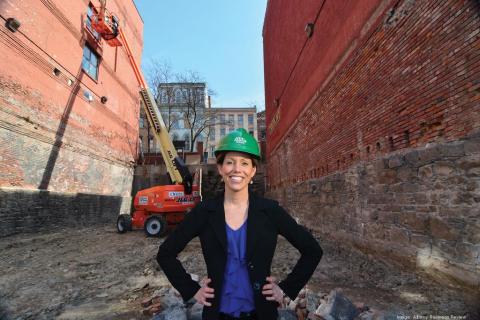Hoosick Valley Contractors: 3 Years Later, New York State Agrees that She's the Boss - Again
Stefanie Wiley got some good news this summer after nearly three years of waiting: New York state agreed to renew a certification that helps her business, Hoosick Valley Contractors, win government contracts.
Wiley had been president and majority owner of the full-service construction company for more than six years when New York state denied her recertification as a woman-owned business enterprise in 2020. In that time, she had more than doubled the size of the construction business.
Wiley appealed the decision soon after, but it took until 2023 for Wiley's attorney, Don Hillmann from Couch White, to negotiate with an appeals attorney from the state.
After months of negotiations, providing hundreds of documents, Hoosick Valley Contractors was officially recertified as a WBE on August 1.
"I'm looking forward to getting back to focusing on my business, it was difficult to not know and difficult to plan," Wiley said. "We were prepared either way, but three years of waiting for my case to be at, it was challenging."
Hoosick Valley Contractors had originally been certified as a WBE in 2014, and reapplied in 2017. Nothing in that time had changed.
In a July 2020 letter, Empire State Development, which oversees the state's minority- and women-owned business enterprises program, said her recertification as a woman-owned business was denied because Wiley "did not demonstrate adequate managerial experience or technical competence to operate the business."
Her certification remained intact until the appeal was decided, a process that took almost three years because of a backlog of cases.
If she lost the appeal, it would have been costly. In 2020, her Rensselaer County business got a little over half of its annual revenue from state contracts, about $6.5 million. The company had $12.7 million in revenue in 2022.
Wiley had to present volumes of paperwork to win her case.
"The issue boiled down to a joint checking account that I have with my husband. The implication was my purchase of the majority shares of the company was funded by my husband," Wiley said. "In the end, we were able to show this was not the case."
Wiley also had to proved she was the primary decision-maker in the business, and demonstrate how she manages her team.
"From this process I learned it's important to fight for what is right," Wiley said. "I hope this win makes it easier for other WBEs facing similar unfair challenges. My advice is to work with an attorney who understands your business."
Hillmann said the decision was able to come without an appeals hearing, which is normally how the process plays out.
"It was a back-and-forth between our office and the appeals attorney at the ESD [over several months] demonstrating that there really wasn't any question that [Wiley] was a very well qualified owner of the company," Hillmann said. "We were really happy with that way that it came out because she's an exceptional manager and there was never any doubt in our mind that she was a solid applicant and deserved the certification."
New York state has one of the highest MWBE utilization rates in the country, with 30.64% of all state contract dollars awarded to such businesses during the 2022 fiscal year. Nearly $3 billion in state contracts were awarded to MWBE firms from June 2021 to June 2022. About $24 billion in state contracts have been awarded to MWBEs since 2011.
That provides a significant financial opportunity for certified MWBEs.
In recent years, minority- and women-owned businesses have complained about the state's difficult certification and recertification process that sometimes takes years to get through. In 2021, an Albany Business Review investigation found the state had made the process to apply and reapply so complex and onerous in an effort to root out fraud that it was hurting businesses it's trying to help.
A recent investigation from the Buffalo News found similar roadblocks, which have held back local businesses from winning contracts on the massive Buffalo Bills stadium project, and hindered the state's own efforts to achieve higher levels of MWBE participation on the project.
Last fall, Gov. Kathy Hochul signed legislation that made some changes to the state's MWBE rules. The two bills address fraud with the MWBE program and allow businesses to use funds received from the minority- and women-owned business development and lending program to refinance debt.
Hochul had proposed further changes in 2022, admitting the program needs some major overhauls. Some of those changes included eliminating the backlog of MWBE applications and creating a faster, dedicated MWBE appeals unit to reduce the backlog of MWBE appeals.
Hillmann said he's noticed cases moving through the backlog more quickly than in previous years.
"There's an effort being made at the ESD to expedite the resolution of some of these matters. Previously, it had taken a very long time, sometimes years," Hillmann said. "We have noticed an uptick in getting matters scheduled for hearing."
Wiley said Hoosick Valley Contractors is focused on bidding for new project work, and has started on a $6 million renovation project at Saratoga High School.
"It should be a rigorous process to obtain the initial certification," Wiley said of the process. "But the recertification process could be improved with increased response time and the ability to have a two-way conversation with the reviewer to understand and clarify the perceived deficiencies before they make the denial."
